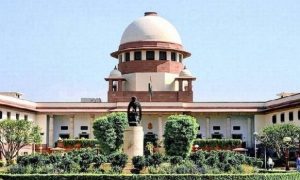The Supreme Court has said even a single instance of illegal demolition is “against the ethos of the Constitution”, while underlining that there is a need to frame pan-India guidelines in such cases
The Supreme Court will pronounce its verdict in pleas against “bulldozer justice” on Wednesday. In past hearings, the court has taken strong exception to illegal demolition targeting those accused in crimes.
The SC has said even a single instance of such an exercise was “against the ethos of the Constitution”, while underlining that there is a need to frame pan-India guidelines in such cases.
The judgement in the matter will be pronounced by a bench of justices BR Gavai and KV Viswanathan.
Let’s take a look at what the SC has said in previous hearings:
November 6: ‘Simply Unacceptable Under Rule of Law’
The last verdict in the matter was delivered on November 6, which was delivered in a matter related to demolition of a house in Maharajganj district of Uttar Pradesh in 2019. The SC said “bulldozer justice” is simply unacceptable under the rule of law, as citizens’ voices cannot be throttled by a threat of destroying their properties.
“Bulldozer justice is simply unacceptable under the rule of law. If it were to be permitted, the constitutional recognition of the right to property under Article 300A would be reduced to a dead letter,” said the bench, which also comprised Justices JB Pardiwala and Manoj Misra.
Article 300A of the Constitution states that no person shall be deprived of his property save by authority of law.
Observing that this is unknown to any civilised system of jurisprudence, a bench headed by then Chief Justice DY Chandrachud said the state must follow due process of law before taking action to remove illegal encroachment or unlawfully constructed structures.
“Justice through bulldozers is unknown to any civilised system of jurisprudence. There is a grave danger that if high-handed and unlawful behaviour is permitted by any wing or officer of the state, demolition of citizens’ properties will take place as a selective reprisal for extraneous reasons,” stated the verdict delivered on November 6.
Penned by Justice Chandrachud, the verdict stated: “Citizens’ voices cannot be throttled by a threat of destroying their properties and homesteads. The ultimate security which a human being possesses is to the homestead.”
The verdict held that the entire process followed by the UP government was “high-handed”, directing the state to pay Rs 25 lakh compensation to the petitioner, whose house was razed for a road project, as an interim measure.
The top court had pulled up the UP government for the “illegal” demolition. “You can’t come with bulldozers and demolish the constructions overnight. You don’t give the family time to vacate. What about the household articles inside the house?” the bench had told the counsel representing the state government.
September 17: ‘No Demolition Without Our Nod’
The SC had halted demolition exercises without its permission till October 1, saying even one instance is against the ethos of the Constitution. A bench of Justices BR Gavai and KV Viswanathan, however, had said its order will not be applicable to unauthorised structures on public roads, footpaths, water bodies and railway tracks.
“Even if there is one instance of an illegal demolition… it is against the ethos of our Constitution,” the bench observed.
Solicitor General Tushar Mehta had told the court that a “narrative” was being built over demolition of properties. “Rest assured that outside noise is not influencing us,” the bench told him.
“Outside noise is not influencing us. We won’t get into question of…which community …at this point…” Justice Viswanathan said. “Narrative not influencing us. We made it clear we won’t come between unauthorised construction… but, the executive can’t be a judge,” Justice Gavai added.
September 2: ‘Property Can’t Be Demolished Even If One Is Convicted’
The SC had underlined the need for guidelines in “bulldozer justice” cases against those accused in crimes, saying a structure cannot be demolished even if one or all occupants of the house have been convicted or found guilty.
“We propose to lay down certain guidelines on a pan-India basis so that the concern with regard to the issues raised (on bulldozer actions) are taken care of,” a bench of Justices Gavai and Viswanathan said.
The bench asked: “How can a demolition take place even if someone is accused? The property cannot be demolished even if a person is convicted. Even if he is a convict, still it can’t be done without following the procedure as prescribed by law.”
The bench also asked for draft suggestions that can be considered by the court to frame pan-India guidelines. “Let us try to resolve the issue on a pan-India basis,” the bench said.
What are the pleas about?
A batch of petitions was filed before the Supreme Court in 2022, in connection with the demolition drive scheduled for April of the same year, in Delhi’s Jahangirpuri. While the drive was stayed, the petitioners prayed for a declaration that authorities could not resort to bulldozer action as a form of punishment.
One of these petitions was by former Rajya Sabha MP and CPI(M) leader Brinda Karat. During a hearing in September 2023, senior advocate Dushyant Dave (appearing for some of the petitioners) voiced concerns about the rising trend of state governments demolishing the homes of people accused in crimes, stressing that the right to a home was a facet of the right to life under Article 21 of the Constitution.
(With PTI inputs)





































